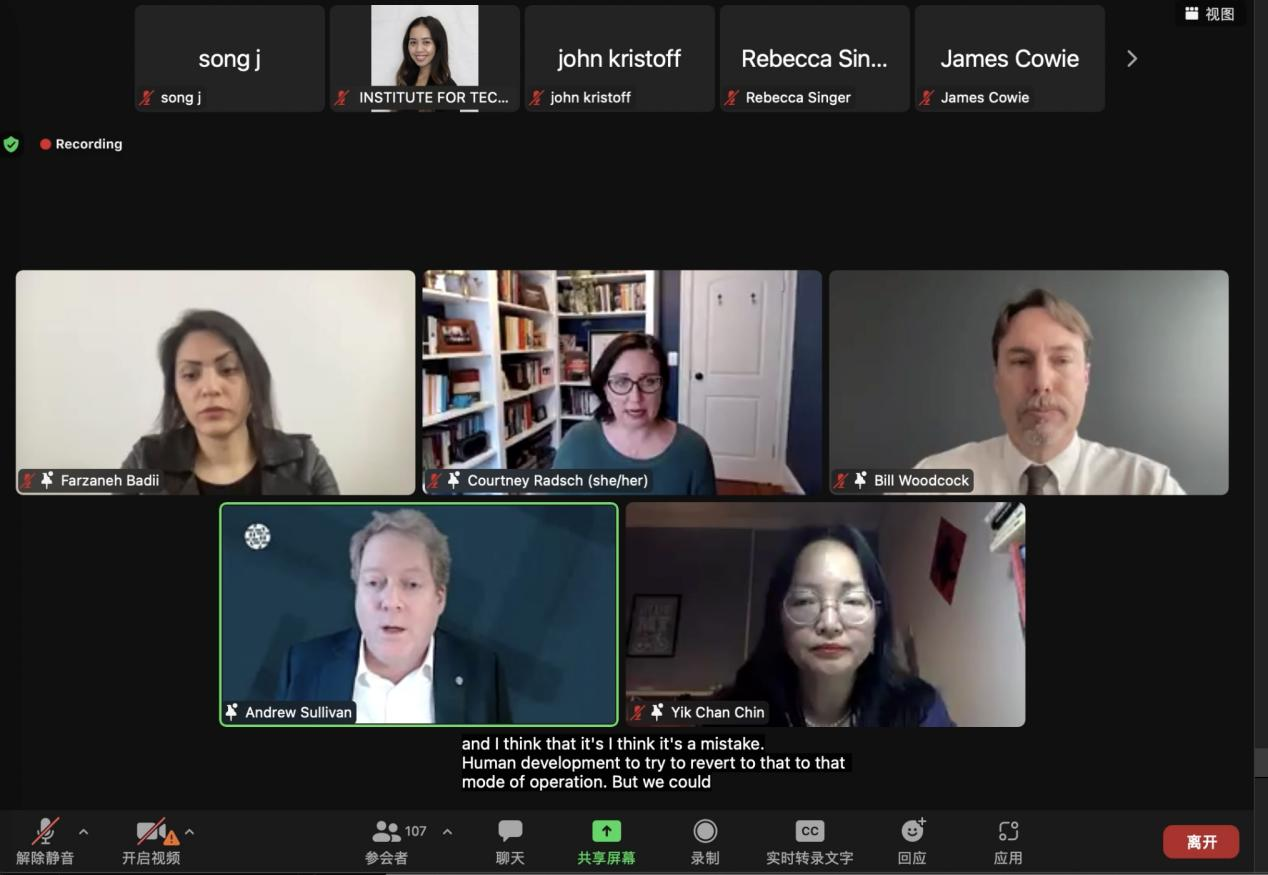Review: Online Seminar on "Internet Sanctions under the Background of Russia-Ukraine conflict"
Release Date: 2022-04-06Views:
At 22:00 Beijing time on April 1, the online seminar "To sanction or not to sanction the Internet access: A SancNet debate", co-hosted by the UCLA Institute of Technology, Law and Policy, and the Global Internet Governance (GigaNet), was successfully held.The seminar was hosted by Courtney Radsch, a researcher at the University of California, Los Angeles, and Yik Chan Chin, an associate professor at the School of Journalism and Communication of Beijing Normal University, participated in the discussion.Andrew Sullivan, CEO of the Internet Society, Bill Woodcock, executive director of international non-profit organization Packet Clearing House, and Farzaneh Badii, founder of digital governance organization Digital Medusa.
With the outbreak of the conflict between Russia and Ukraine, a "cyber war" between the two countries began.The Ukrainian government has previously explicitly called for Internet sanctions against Russia.In response, Internet governance organizations rejected the proposal, insisting that the Internet is a basic function and design for all people, committed to maintain the normal operation of the global Internet; and supporters advocate accurate hacking of Russia's IP and domain names to avoid its war propaganda.Therefore, the seminar aims to study the desirability and potential consequences of sanctions on the Internet,and combined with other Internet-related sanctions cases, to explore whether there are sanctions and resistance measures against Internet infrastructure and services to help people affected by the war.

Experts expressed their views on the Internet sanctions in the War between Russia and Ukraine.Bill Woodcock points out that currently, the government is not aware of the nature of Internet resources, and that Internet companies know nothing about what is a sanction,which is an extremely dangerous phenomenon.Therefore, government officials and network experts should strengthen exchanges to avoid the chilling effect, which will cause network operators to misread government regulations and bring humanitarian consequences.In addition, Internet sanctions are different from economic sanctions. They may involve the key issues of human rights and extraterritorial rights. To impose the policies of one country on the people of other countries is disrespectful to the freedom and rights of the people of that country.
Andrew Sullivan fears that the sanctions will divide the Internet.Thanks to its decentralized operation,the Internet has become a source of innovation and development.We should not attempt to interfere with this neutral, purely technical operation.The sanctions will make the Internet dismantled into independent online services, leaving users disconnected from each other, which will be a harm to the nature of the Internet.He believes that because all parties have their own interests and needs, we can never find a way to impose sanctions in the most effective way.
Farzaneh Badii pointed out that we should first think about the ultimate goal of sanctions and ensure which are the "red lines" that cannot be crossed.It is worth mentioning that Internet sanctions are fundamentally different from sanctions against other industries.For example, we can impose targeted economic sanctions on some subjects, but when it comes to the Internet, it is difficult for ordinary people not to be affected.Today, the sanctions on Russia have affected domain names, Internet protocols distribution and content transmission, already harming the Internet use of ordinary people.Therefore, it is impossible to impose targeted sanctions in the Internet field.
Associate professor Yik Chan Chin said that the Internet infrastructure and resources are the common wealth of all mankind, and are crucial to maintaining the stability and security of the Internet.Any form of sanctions should not destroy these basic resources.Moreover, the power to impose sanctions should not be delegated to a country, but international organizations like Open-ended Working Group (OEWG) lead regulation and regulation.In addition, she believes that we should pay special attention to the sanctions imposed by Internet giants like Facebook and Twitter at the content level, and should strengthen the content reviews on such social platforms, focusing on whether they violate relevant laws and regulations.
Now that the information operations in the Russo-Ukrainian war have affected the military and ordinary people, where should we go in the future?Faced with this problem, Bill Woodcock and Andrew Sullivan believe that the key is to educate and regulate Internet organizations and private institutions to avoid misreading the legal provisions on sanctions and harming the rights of ordinary people.
Farzaneh Badii noted that the sanctions do not solve the issue.We need to strengthen connectivity, maintain the integrity of the global Internet, and use it to help people hurt in the war.
Yik Chan Chin believes that some subjects are using Internet infrastructure as a weapon for geopolitical reasons.Global institutions should play an active role in this to help all parties coordinate and reach consensus, while we should also consider the issues of legitimacy, transparency and accountability.
Meeting English web page:
https://www.giga-net.org/to-sanction-or-not-to-sanction-the-internet-access-a-sancnet-debate/
Photo and text by Song Jing




 京ICP备13009620号
京ICP备13009620号